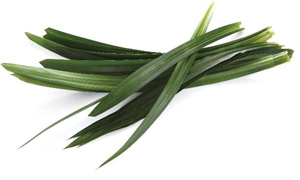Aroma of Screwpine (Pandanus amaryllifolius)
 Screwpine
leaves are used throughout Southeast Asia in cooking. The fresh leaves
impart that unmistakable aroma and green coloring (chlorophyll) to
cakes, jellies, rice, sweets, etc. The leaves are used extensively in
soups and desserts, especially those that involve coconut milk. Screwpine
leaves are used throughout Southeast Asia in cooking. The fresh leaves
impart that unmistakable aroma and green coloring (chlorophyll) to
cakes, jellies, rice, sweets, etc. The leaves are used extensively in
soups and desserts, especially those that involve coconut milk.
It is thought that the fragrance comes not
from the essential oil but from the oxidation and breakdown of a yellow
pigment. The essential oil can be used as a repellent against
cockroaches. Powdered leaves are used against the weevil (Callosobruchus
chinensis), which infests mung beans.
Screwpine leaves are mainly used to flavor
rice and desserts in Thai cuisine. It is used to make a sweet coconut
cream which is poured over desserts as a topping.
The plant consists of a stem bearing
spirally arranged leaves, with aerial roots (prop roots) at the base of
the stem and more roots growing into the ground at the bottom. The
plants are usually short and not more than 1.5 meters tall. The leaves
are more or less tiff, linear and acute, measuring 30 to 60 cm in
length. A characteristic of all pandan species is that the leaves are
keeled beneath and have prominent twin lateral pleats above (to give an
M-shaped cross-section). The margins of the leaves are spineless, unlike
other Pandanus species which have very sharp spines along the margins of
the leaves. The stem is stout and low-branching. Little is known of the
flowers and fruits as the plant remains in a sterile state.
To preserve the color and turgidity of the
leaves, wrap them in wet paper towels and store in the vegetable crisper
of the refrigerator. For long-term storage, one may consider freezing
the leaves for use when needed (after thawing). Better yet, grow a pot
of the plant at home from which leaves can be harvested fresh whenever
they are needed.

Happy Cooking,
Carol |

